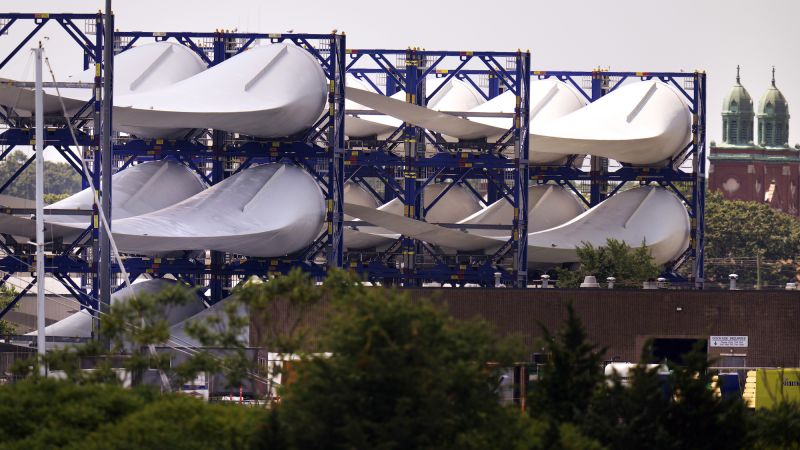Charles Krupa/AP/File
Giant wind turbine blades for the Vineyard Winds project are stacked on racks in New Bedford, Massachusetts.
CNN
—
The massive offshore wind turbine blade that broke and spread fiberglass and foam debris across Nantucket beaches this week was one of several recent failures of blades made by GE Vernova – a top US wind turbine manufacturer.
Several GE Vernova blades have broken on onshore and offshore turbines in Germany, Sweden, Lithuania and the United Kingdom in recent years. The broken blades were a variety of different sizes and types, and the company’s investigations revealed there were different root causes for the damage, including transportation, handling, and manufacturing deviations, according to a company source with knowledge of the investigations.
Broken wind turbines are “highly unusual and rare,” a GE Vernova representative told Nantucket residents and officials on Wednesday. A company spokesperson said in a statement it was “working with urgency to complete our root cause analysis of this event.”
The broken turbine is a major setback to Vineyard Wind, which was a bright spot for the nascent and struggling offshore wind industry in the US. The joint venture between Avangrid and Copenhagen Infrastructure Partners has 10 operational turbines and plans to install 62 total.
The federal government suspended operations and construction of the project while it conducts its own investigation of the broken blade.
While GE Vernova is in the spotlight amid the Nantucket failure, it’s not the only wind turbine manufacturer that has had this issue, according to Indra Mukherjee, associate director of clean energy technology research for S&P Global Commodity Insights.
“It is clear that major (manufacturers) have all faced blade breakages,” Mukherjee said in an email. The failures were caused by issues such as design flaws and manufacturing lapses by contractors, he said.
As the global wind energy industry grows, the size of the turbines themselves are also growing. But Mukherjee said such rapid upscaling also comes with “immense engineering challenges,” with blades in particular emerging as a “significant vulnerability.”
WBZ
Some of the wind turbine debris that has washed up on Nantucket beaches has been large and sharp.
Town of Nantucket Current
Last year, three GE Vernova blades broke at the Alfstedt-Ebersdorf onshore wind farm in Germany. An independent investigation into the incident is still ongoing and likely won’t be finished until later this year, according to Julia Pschribülla, a spokesperson for that farm’s developer, Energiekontor.
Pschribülla said the wind park won’t operate until the investigation is finished and determines “other turbines of the same type are not at risk of comparable damage.”
Wind turbine blades, which are made from fiberglass, wood, foam and carbon fiber, must endure all manner of harsh weather and constant wear and tear, according to Mukherjee. Adding to that, most of the big turbines and blades on the market are relatively new designs, meaning “occasional failures are inevitable as the industry climbs the learning curve,” Mukherjee said.
The total number of broken turbine blades has been relatively low compared to the large number of blades manufactured each year. Wind farm developers ordered around 20,000 turbines – each with several individual blades – in 2023.
“If we consider that for scale, then the failure rate remains low,” Mukherjee said.
After the broken turbine debris prompted beach closures, Nantucket town officials questioned the lack of discussion of the risk posed by wind turbines breaking, compared to discussions about visual impacts or potential risks to marine life.
“Personally, I never contemplated something like this, it just never occurred to me that we were at risk of this situation,” Nantucket select board chair Brooke Mohr previously told CNN.
In a statement, a GE Vernova spokesperson said the company’s “top priority is safety and minimizing the impact of this event on the communities surrounding the Vineyard Wind farm in Massachusetts.”
The project was set to double the number of turbines spinning off the East Coast, and state leaders in Massachusetts have viewed it as a big boost to the state’s ability to generate electricity. Energy analysts recently pointed to the project and other recent industry rebounds as signs of momentum in wind energy.
Now the project is in limbo, and could remain so until the federal investigation is complete.
